This article is about the city in Arizona. For other uses, see Scottsdale (disambiguation). City in Arizona, United States
| Scottsdale, Arizona Vaṣai S-vaṣonĭ | |
|---|---|
| City | |
  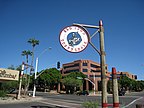 Clockwise from top: Downtown Scottsdale waterfront, Old Town Scottsdale, and Taliesin West
Clockwise from top: Downtown Scottsdale waterfront, Old Town Scottsdale, and Taliesin West | |
 Flag Flag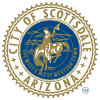 Seal Seal | |
| Nickname: "The West's Most Western Town" (official) | |
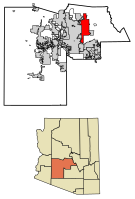 Location in Maricopa County, Arizona Location in Maricopa County, Arizona | |
   | |
| Coordinates: 33°29′35″N 111°55′34″W / 33.49306°N 111.92611°W / 33.49306; -111.92611 | |
| Country | United States |
| State | Arizona |
| County | Maricopa |
| Incorporated | June 25, 1951 |
| Named for | Winfield Scott |
| Government | |
| • Type | Council–manager |
| • Mayor | David Ortega |
| Area | |
| • Total | 184.44 sq mi (477.70 km) |
| • Land | 184.00 sq mi (476.57 km) |
| • Water | 0.44 sq mi (1.14 km) |
| Elevation | 2,165 ft (660 m) |
| Population | |
| • Total | 241,361 |
| • Rank | US: 93rd |
| • Density | 1,311.72/sq mi (506.46/km) |
| Time zone | UTC−7 (MST (no DST)) |
| ZIP codes | 85250–85264, 85266-85269, 85271 |
| Area code | 480 |
| FIPS code | 04-65000 |
| GNIS ID | 2411845 |
| Website | www |
Scottsdale is a city in the eastern part of Maricopa County, Arizona, United States, and is part of the Phoenix metropolitan area. Named Scottsdale in 1894 after its founder Winfield Scott, a retired U.S. Army chaplain, the city was incorporated in 1951 with a population of 2,000. At the 2020 census, the population was 241,361, which had grown from 217,385 in 2010. Its slogan is "The West's Most Western Town". Over the past two decades, it has been one of the fastest growing cities and housing markets in the United States.
Scottsdale is 31 miles (50 km) from its northern to southernmost edge, and covers 184.5 square miles (478 km). The city is bordered by the city of Phoenix to the west, Tonto National Forest to the north, the McDowell Mountains to the east, and the Salt River to the south.
History
Early history
Scottsdale was originally a Pima village known as Vaṣai S-vaṣonĭ, meaning 'rotting hay'. Some Pima people remain there today. Until the late 1960s, there was a still-occupied traditional dwelling on the southeast corner of Indian Bend Road and Hayden Road. The Pima who live in Scottsdale today reside in modern houses, not traditional dwellings. Many Pima and Maricopa people live in the Salt River Pima-Maricopa Indian Community, which borders Scottsdale to the south and east.
Early history and establishment
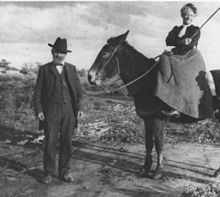
In the early to mid-1880s, U.S. Army Chaplain Winfield Scott visited the Salt River Valley and was impressed with it and its potential for agriculture. Returning in 1888 with his wife, Helen, he purchased 640 acres (260 ha) where historic Old Town is now, for $3.50 an acre ($92 as of 2015) . Another landowner in the Southern part of town, Albert G. Utley, filed plans with Maricopa County for a city named "Orangedale," using Scott's Field as a border. When the newspaper, then called the Arizona Republican, published an article about the plan, they erroneously called the town "Scottsdale." The article drew some publicity for the town, and ultimately this convinced Utley to change his filing and officially name the town "Scottsdale."
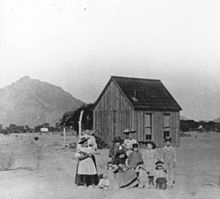
In 1896, the Scottsdale Public School system was established, and opened the first schoolhouse, which was followed by the opening of the first general store by J. L. Davis, which also housed the first post office for Scottsdale in 1897. In the early 1900s the community supported an artists and writers culture, culminating in the opening of the region's first resort in 1909, the Ingleside Inn, just south of the Arizona Canal and west of the Crosscut Canal (Indian School Road at about 64th Street) in what is today Scottsdale. Also in 1909, Cavalliere's Blacksmith Shop opened in downtown Scottsdale, and the original schoolhouse was replaced by the much more expansive Little Red Schoolhouse, which stands to this day. While not in its original building, Cavalliere's has been in continuous operation since that time.
In 1912, both the Phoenix Street Railway Company and a competitor, the Salt River Valley Electric Railway Company, proposed building streetcar lines to Scottsdale, but due to an economic downturn, neither was built. Between 1908 and 1933, due to the construction of the Granite Reef and Roosevelt dams (in 1908 and 1911, respectively), Scottsdale's population experienced a boom, growing steadily during those years. It became a small market town providing services for families involved in the agricultural industry.
During the First World War, Scottsdale and its environs supported a large cotton farming industry, due to the creation of Long Staple Egyptian Cotton, developed by the US Department of Agriculture. Cotton is still grown in southern Arizona, but Scottsdale's cotton boom ended with the loss of government contracts at the end of the war.

In 1920, a second resort was opened on 12 acres (4.9 ha) of property owned by the artist Jessie Benton Evans. Called the Jokake Inn, meaning "mud house", the structure still stands on the grounds of the Phoenician Resort.
The Depression years saw an influx of artists and architects to Scottsdale, which included, in 1937, Frank Lloyd Wright. Wright and his wife purchased 600 acres (240 ha) acres of desert at the foot of the McDowell Mountains and established Taliesin West, his winter home and his architectural firm's southwestern headquarters. Scottsdale and the rest of Phoenix have seen an everlasting influence from Wright. Many buildings throughout the region were designed by him. His influence on the regional architecture is commemorated by a major street bearing his name and a 125-foot (38 m) spire memorial designed by Wright in North Scottsdale.
World War II
Among the more significant events during the years of World War II was the opening of Thunderbird II Airfield in 1942 (it later became Scottsdale Airport), where 5,500 pilot cadets received their primary flight training before the war's end. Scottsdale was the site of a German POW camp at the intersection of Scottsdale and Thomas Roads in what today is Papago Park.
Development of Indian Bend Wash, 1950s–1970s
In 1950, the town continued to grow as Motorola became the first of many technology companies to build a plant in Scottsdale. It built a second plant in 1956. With a population of approximately 2,000, the city was incorporated on June 25, 1951. It appointed its first mayor, Malcolm White, and adopted the motto "The West's Most Western Town". The seal, depicting a mounted cowboy surrounded by a 64-pointed starburst, was designed by Mrs. Gene Brown Pennington. The city also became a tourist destination with the opening of the city's first modern resorts, the Hotel Valley Ho and the Safari Hotel, in 1956.
The town began a period of rapid population growth after its incorporation in 1951, growing from 2,000 to 10,000 residents during the 1950s. This growth necessitated development into the floodplain known as the Indian Bend Wash. Floodplains throughout history have been enticing locations for development due to their flatness, ease of building and inexpensiveness. This is even more tempting in a desert, where flooding so rarely happens. As Scottsdale expanded, the north-south Indian Bend Wash virtually bisected the city. In the late 1950s, the problem became more and more pronounced, until in 1959 the Arizona State Legislature formed the Maricopa County Flood Control District (MCFCD). The MCFCD became the lead player in developing a comprehensive flood plan for the entire county.
At the same time, the United States Army Corps of Engineers began to look into flooding in Maricopa County. Over the next several years, it presented several plans, which all revolved around constructing concrete canals and levees to channel and divert the floodwaters, as well as building bridges over the canal, similar to the storm drains of Los Angeles. But during MCFCD meetings between 1961 and 1963, a different course of action was developed. This plan became known as the multi-use, or Greenbelt, concept. The two concepts were at odds with one another until the canal plan was defeated in a bond referendum in 1965. In 1966, a study was commissioned that validated the Greenbelt concept as a way to prevent flood damage. After a major flood in 1972, work on the Greenbelt project began in earnest. It was completed in 1984, although minor projects continue. Today, the 12-mile-long (19 km) Scottsdale Greenbelt connects four city parks—Vista del Camino Park, Eldorado Park, Indian School Park and Chaparral Park—through a 25-mile (40 km) bike path.
Further expansion and development, 1970s–1980s
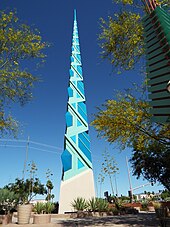
The city continued to grow in the 1960s and 1970s, the population reaching almost 68,000 by 1970. Most of the unused property within the city limits was to the north, so that was the direction in which the city expanded. The city, which in 1959 had spanned 5 sq mi (13 km), expanded its borders to encompass 62 sq mi (160 km). Large ranch tracts covered huge areas in the northern part of the city. One of the largest of these was the McCormick ranch, a 4,236-acre (1,714 ha) ranch serving much of the eastern boundary of Scottsdale owned by Fowler and Anne McCormick. Fowler's paternal grandfather was Cyrus McCormick, the inventor of the grain reaper, and his maternal grandfather was John D. Rockefeller. When Anne died in 1970, the property was sold to Kaiser-Aetna for $12.1 million. This started a series of large-scale, master-planned communities within Scottsdale's borders, including Scottsdale Ranch (1978), Gainey Ranch (1980), McDowell Mountain Ranch (1992), Desert Mountain (1986), and DC Ranch (1990s).
In 1975, the city annexed the "east Shea" section, bordering Fountain Hills, expanding its area from 62.2 to 88.6 sq mi (161 to 229 km). This was followed by a four-year period from 1981 to 1984 during which the city annexed an additional (almost) 80 sq mi (210 km).
Faced with this rapid expansion and growth, many residents became concerned about losing their southwestern scenery. The McDowell Sonoran Conservancy was born in 1991. Teaming with developers, a plan was developed to set aside the McDowell Mountains and adjoining areas in a huge preserve. In 1995, Scottsdale's citizens voted to implement a sales tax to purchase acreage for this purpose. When completed, the 36,000 acres (15,000 ha) planned for the McDowell Sonoran Preserve will be nearly one-third of Scottsdale's land area, equal in size to Bryce Canyon National Park.
Modern
From its official incorporation in 1951 with a population of 2,000, Scottsdale has grown to a 2020 census count of 241,361. It is now the state's seventh-largest city. Scottsdale is commonly defined by its high quality of life, and in 1993 was one of several cities to receive a "Most Livable City" award from the United States Conference of Mayors. The Scottsdale Airpark, surrounding the city's airport, became a hotspot for a variety of large and small businesses, ranging from light industry to luxury auto sales. The Airpark in the 2000s emerged as one of the top employment centers in the Phoenix metro area. The airport supported 3,462 jobs, which boosted the Scottsdale economy.
Geography

The city is in the Salt River Valley, or the "Valley of the Sun", in the northern reaches of the Sonoran Desert. Scottsdale, 31 miles (50 km) long and 11.4 miles (18.3 km) wide at its widest point, shares boundaries with many other municipalities and entities. On the west, Scottsdale is bordered by Phoenix, Paradise Valley, and unincorporated Maricopa County land. Carefree is along the eastern boundary, as well as sharing Scottsdale's northern boundary with the Tonto National Forest. To the south Scottsdale is bordered by Tempe. The southern boundary is also occupied by the Salt River Pima-Maricopa Indian Community, which extends along the eastern boundary, which also borders Fountain Hills, the McDowell Mountain Regional Park and more unincorporated Maricopa County land. The highest point is Butte Peak at an elevation of 4,890 ft.
According to the United States Census Bureau, the city has an area of 184.4 square miles (478 km), of which 0.4 square miles (1.0 km), or 0.24%, are water.
Environmental issues
From the 1950s to the 1970s, several large manufacturing companies in the Scottsdale and Tempe areas used the solvent trichloroethylene (TCE) in their manufacturing and operating processes. In 1981, TCE began to show up in two Scottsdale drinking wells, and in 1983, the Indian Bend Wash superfund site was listed on the Environmental Protection Agency's National Priorities List. Physical construction of environmental remediation systems was completed by 2006, with soil cleanup expected to be completed in five years and groundwater cleanup in 30 years.
The city developed one of the first automated garbage trucks in 1969, replacing crews who dumped cans into a train of open trailers pulled by a truck, with a single operator sitting in an air conditioned cab.
Cityscape

The city is loosely divided into four areas: South Scottsdale (McKellips Road north to Thomas Road), Old Town (Downtown) Scottsdale, Central Scottsdale (also known as the "Shea Corridor," extending from Camelback Road north to Shea Boulevard), and North Scottsdale.
South Scottsdale has for many years been the working-class neighborhood. The median resale home price is US$291,500, compared to $667,450 in North Scottsdale. Part of McDowell Road in South Scottsdale used to be known as "Motor Mile," having at one time 31 dealerships on the street. The strip at one time generated over $10 million in sales tax revenue each year and was one of the most profitable auto-miles in the United States. In recent years, many of these dealerships have left the city, including 6 in 2008 alone. South Scottsdale is the home to a new research center for Arizona State University known as SkySong, a collaboration between the university, local business, and global companies. The development has attracted the research and development arms of a number of international corporations.
Old Town Scottsdale is an area with many streets, old-fashioned stores, restaurants, bars, nightclubs, and art galleries. It contains the major nightlife for the area and is a major art center of metro Phoenix. Scottsdale's main cultural district is also in this area, which includes the high-end Scottsdale Fashion Square, one of the country's 20 largest malls. The district has seen a revival, with new condominiums and hotels under construction.
The Shea Corridor is so named because it is in close proximity to the east-west Shea Boulevard. The houses in this region were generally built during the 1970s. Real estate in the Shea Corridor (Central Scottsdale) has increased during the 1990s, and overall, the Phoenix-Mesa-Scottsdale real estate market saw the largest gain in house prices in the nation during the mid-2000s with a 38.4% increase in value. A number of communities in this central region of Scottsdale remain among the most highly desired residential areas in the metropolitan area, including Gainey Ranch and McCormick Ranch. A large portion of Scottsdale Road in the Shea Corridor has been dubbed the Resort Corridor for the high number of resorts on the street. The second Ritz Carlton in the Phoenix metropolitan area will be along this corridor.

North Scottsdale is the most actively developed area of Scottsdale, as it was historically the least built up. This part of the city also claims many of the most expensive houses in Arizona, with many exceeding $5 million in value. The city's borders are rapidly expanding to the east and west in this area, containing the McDowell Mountain range. Much of the residential boom in North Scottsdale is driven by available land to build coupled with the fast growth of Scottsdale Airpark, the second largest employment center in the Phoenix metropolitan, as of 2008. The Scottsdale Airpark, home to over 55,000 employees, 2,600 businesses and 23,000,000 square feet (2,100,000 m) of office space is expected to continue growing by over 3,000 employees per year. Many important companies are headquartered or have regional headquarters in the park, including Acronis, AXA, GE Capital, DHL, Discount Tire Company, Fidelity Investments, Blue Yonder, The Vanguard Group and Quicken Loans.
Climate
Scottsdale's climate is arid. Winters are mild to warm and summers are extremely hot. The lowest temperature ever recorded in the city is 16.0 °F (−8.9 °C), on January 7, 1913, and the highest was 122 °F (50 °C), on June 26, 1990.
| Climate data for Scottsdale, Arizona (Scottsdale Municipal Airport), 1991–2020 normals, extremes 2000–present | |||||||||||||
|---|---|---|---|---|---|---|---|---|---|---|---|---|---|
| Month | Jan | Feb | Mar | Apr | May | Jun | Jul | Aug | Sep | Oct | Nov | Dec | Year |
| Record high °F (°C) | 83 (28) |
86 (30) |
97 (36) |
103 (39) |
110 (43) |
118 (48) |
117 (47) |
115 (46) |
113 (45) |
105 (41) |
96 (36) |
83 (28) |
118 (48) |
| Mean maximum °F (°C) | 76.9 (24.9) |
80.9 (27.2) |
88.8 (31.6) |
97.3 (36.3) |
103.1 (39.5) |
111.4 (44.1) |
112.4 (44.7) |
111.1 (43.9) |
106.7 (41.5) |
98.3 (36.8) |
89.0 (31.7) |
76.9 (24.9) |
114.1 (45.6) |
| Mean daily maximum °F (°C) | 66.5 (19.2) |
68.7 (20.4) |
75.7 (24.3) |
82.8 (28.2) |
92.8 (33.8) |
102.0 (38.9) |
104.1 (40.1) |
102.9 (39.4) |
98.2 (36.8) |
87.3 (30.7) |
74.8 (23.8) |
64.6 (18.1) |
85.0 (29.5) |
| Daily mean °F (°C) | 54.9 (12.7) |
57.3 (14.1) |
63.7 (17.6) |
70.6 (21.4) |
79.3 (26.3) |
89.1 (31.7) |
93.4 (34.1) |
92.3 (33.5) |
86.7 (30.4) |
75.0 (23.9) |
62.7 (17.1) |
53.6 (12.0) |
73.2 (22.9) |
| Mean daily minimum °F (°C) | 43.4 (6.3) |
46.0 (7.8) |
51.7 (10.9) |
58.3 (14.6) |
66.7 (19.3) |
76.2 (24.6) |
82.6 (28.1) |
81.8 (27.7) |
75.3 (24.1) |
62.7 (17.1) |
50.6 (10.3) |
42.5 (5.8) |
61.5 (16.4) |
| Mean minimum °F (°C) | 32.1 (0.1) |
35.5 (1.9) |
41.7 (5.4) |
48.1 (8.9) |
55.5 (13.1) |
67.4 (19.7) |
74.0 (23.3) |
73.3 (22.9) |
65.3 (18.5) |
51.4 (10.8) |
40.1 (4.5) |
32.0 (0.0) |
30.0 (−1.1) |
| Record low °F (°C) | 25 (−4) |
27 (−3) |
33 (1) |
40 (4) |
51 (11) |
63 (17) |
70 (21) |
68 (20) |
57 (14) |
40 (4) |
31 (−1) |
28 (−2) |
25 (−4) |
| Average precipitation inches (mm) | 1.11 (28) |
1.24 (31) |
1.10 (28) |
0.34 (8.6) |
0.16 (4.1) |
0.05 (1.3) |
0.90 (23) |
0.83 (21) |
0.60 (15) |
0.62 (16) |
0.79 (20) |
0.99 (25) |
8.73 (221) |
| Average precipitation days (≥ 0.01 in) | 4.2 | 3.9 | 2.9 | 1.5 | 0.9 | 0.4 | 4.1 | 3.9 | 2.4 | 2.5 | 2.4 | 4.6 | 33.7 |
| Source 1: NOAA | |||||||||||||
| Source 2: National Weather Service (mean maxima/minima 2006–2020) | |||||||||||||
Demographics
| Census | Pop. | Note | %± |
|---|---|---|---|
| 1920 | 1,047 | — | |
| 1930 | 2,761 | 163.7% | |
| 1950 | 2,032 | — | |
| 1960 | 10,026 | 393.4% | |
| 1970 | 67,823 | 576.5% | |
| 1980 | 88,622 | 30.7% | |
| 1990 | 130,075 | 46.8% | |
| 2000 | 202,705 | 55.8% | |
| 2010 | 217,385 | 7.2% | |
| 2020 | 241,361 | 11.0% | |
| U.S. Decennial Census | |||
2020 Census
At the 2020 census, there were 241,361 people. The racial make-up of the city was 78.5% Non-Hispanic White, 2.0% African American, 0.8% Native American, 5% Asian, 0.1% Pacific Islander and 9.8% Hispanic or Latino.
| Race / Ethnicity (NH = Non-Hispanic) | Pop 2000 | Pop 2010 | Pop 2020 | % 2000 | % 2010 | % 2020 |
|---|---|---|---|---|---|---|
| White alone (NH) | 178,462 | 182,011 | 189,510 | 88.04% | 83.73% | 78.52% |
| Black or African American alone (NH) | 2,398 | 3,484 | 4,601 | 1.18% | 1.60% | 1.91% |
| Native American or Alaska Native alone (NH) | 1,039 | 1,462 | 1,477 | 0.51% | 0.67% | 0.61% |
| Asian alone (NH) | 3,919 | 7,128 | 11,949 | 1.93% | 3.28% | 4.95% |
| Pacific Islander alone (NH) | 161 | 189 | 214 | 0.08% | 0.09% | 0.09% |
| Some Other Race alone (NH) | 209 | 276 | 1,117 | 0.10% | 0.13% | 0.46% |
| Mixed Race or Multi-Racial (NH) | 2,406 | 3,610 | 8,960 | 1.19% | 1.66% | 3.71% |
| Hispanic or Latino (any race) | 14,111 | 19,225 | 23,533 | 6.96% | 8.84% | 9.75% |
| Total | 202,705 | 217,385 | 241,361 | 100.00% | 100.00% | 100.00% |
2010 Census
At the 2010 census, the population was 217,385, of whom 69,967 lived in owner-occupied housing and 32,306 in renter occupied, a total of 101,273 households in the city. The population density was 1,181.4 per square mile (456.1/km). There were 124,001 housing units at an average density of 673.9/sq mi (260.2/km). The racial make-up of the city was 89.3% White, 1.7% Black or African American, 0.8% Native American, 3.3% Asian, 0.1% Pacific Islander, 2.5% from other races and 2.3% from two or more races. 8.8% of the population were Hispanic or Latino of any race.
There were 101,290 households, of which 20.0% had children under the age of 18 living with them. According to the 2010 census, 51.7% of Scottsdale's population was female, while 48.3% was male. 17.7% of the population were under the age of 18, 5.0% from 20 to 24, 32.6% from 25 to 49, 22.8% from 50 to 64 and 19.9% were 65 years of age or older. The median age was 42 years.
According to a 2007 estimate, the median household income was $90,533 and the median family income for a family was $122,289. The per capita income was $59,158. About 3.4% of families and 5.8% of the population were below the poverty line, including 5.4% of those under age 18 and 5.9% of those age 65 or over.
Religion
Scottsdale is home to a large number of churches, chapels, temples, synagogues, mosques and other places of religious worship. Though the majority of Scottsdale residents consider themselves of, or practicing of, the Christian faith(s) – including Protestant and Roman Catholic – the city's high population growth over the years has resulted in a more diverse population. Most notably, greater numbers of Eastern Orthodox and Jews have been added to the population. Though smaller in number, Hindu, Sikh and Buddhist communities also exist within the city of Scottsdale. There is also a small population of members of the Church of Jesus Christ of Latter-day Saints, as is common throughout Phoenix, Arizona, and the Western United States.
The first church founded in Scottsdale was the First Baptist Church of Scottsdale, which was built by Scott and his family. The church has named a small non-profit coffee shop on the corner of their campus after Scott, called Winfield's. Congregation Beth Israel, the oldest Reform Judaism congregation in the Phoenix metropolitan area is in Scottsdale, and is the largest congregation in Arizona. In North Scottsdale, there is the Jewish Community Center of Phoenix and the New Shul. The community center was originally in central Phoenix, it had eventually outgrown the location and was looking to relocate and build a more expansive campus.
In 2009, a new Armenian Apostolic church was built in the city, representing the larger numbers of Armenians in the Phoenix Metropolitan Area.
Economy
See also: List of major corporations in PhoenixThe tourism industry is Scottsdale's primary employer, accounting for 39% of the city's workforce. In 2005, Scottsdale attracted over 7.5 million visitors to the city, providing an economic impact of over $3.1 billion.
The city of Scottsdale is tied with Atlanta for fourth, after New York City, Las Vegas, and Chicago respectively, as having the most AAA Five-Diamond hotels and resorts in the United States. In 2015, AAA bestowed four such properties in Scottsdale with the highest honor: The Phoenician and The Canyon Suites, part of The Luxury Collection, Four Seasons Hotels Scottsdale at Troon North, and the Fairmont Hotels and Resorts Princess Resort and Spa.
In 2016, Scottsdale had the highest number of destination spas per capita of any city in the United States.
The region's year-round warm weather and abundant sunshine is a major factor in Scottsdale's tourism appeal. In particular, during the winter, thousands of tourists and retirees from the midwest, the northeast, and as far away as Canada (known locally as "snowbirds") flood the area with visits from brief to long term. Those who practice the same migration routine annually often end up purchasing winter homes in the area.
The Mayo Clinic has one of its three major campuses in Scottsdale. This and its resulting effects have made Scottsdale an attractive destination for medical care.
The aviation industry has also grown in Scottsdale, with the construction of Scottsdale Airport in North Scottsdale, in the 1960s. Today, it is one of the busiest single-runway airports in the United States in terms of aircraft operations. However, there is little to no commercial air service; nearly all operations are corporate or general aviation.
The immediate area surrounding the Scottsdale Airport, known locally as the Airpark, has developed rapidly as a regional center of commerce. By 2004, the Airpark had grown to become the second-largest employment center in the Phoenix Metropolitan Area, with over 50,000 people being employed within a few-mile radius of the airport itself – notably in financial, retail, service, technological, design and manufacturing fields.
Among the companies headquartered in Scottsdale are APL, Cold Stone Creamery, Carlisle Companies, Discount Tire, Discovery Land Company, Fender, Go Daddy, Blue Yonder, Kahala, Kona Grill, Liveops, Magellan Health, Meritage Homes, Nextiva, Advisor Group, Paradise Bakery & Café, P.F. Chang's China Bistro, Rural Metro, Axon, and United Blood Services.
Top employers
According to the city's 2022 Comprehensive Annual Financial Report, the top employers in the city are:
| # | Employer | # of employees |
|---|---|---|
| 1 | Honor Health | 7,131 |
| 2 | Vanguard | 2,770 |
| 3 | General Dynamics Mission Systems | 2,700 |
| 4 | City of Scottsdale | 2,612 |
| 5 | Scottsdale Unified School District | 2,093 |
| 6 | Mayo Clinic | 1,917 |
| 7 | Axon | 1,600 |
| 8 | Nationwide Specialty Insurance | 1,407 |
| 9 | CVS Health | 1,345 |
| 10 | The Hartford | 785 |
Retail
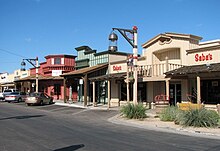
The city has several corporate retail outlets as well as independent boutiques.
There are many shopping areas within the city of Scottsdale, ranging from small districts to large centers. The most notable regional centers include the Kierland Commons and Scottsdale Quarter in North Scottsdale, and Scottsdale Fashion Square in Downtown Scottsdale, a major destination for high-end shoppers. These shopping centers (and others), in Scottsdale claim dozens of marquee brands that are unique to both Phoenix and the Southwestern region.
As of 2016, Scottsdale Fashion Square was ranked in the top 25 most visited malls in the country by Travel + Leisure magazine. It has consistently been one of the most profitable malls in the United States, being ranked in 2016 as the second highest sales per square foot mall in the country, The center is anchored by Neiman Marcus, Macy's, Nordstrom, and Dillard's.
One Scottsdale, a multi-use development by DMB Associates, aims to be the next luxury retail center serving the North Scottsdale area. In a three-mile (4.8 km) radius, the center sees an average household income of $110,292, and its 10-mile (16 km) zone has more households earning over $100,000 than several famous retail destinations, including Bal Harbour, Naples, Aspen, and The Hamptons.
Palmeraie, a 300,000-square-foot (28,000 m), outdoor mixed-use project planned for the SWC of Indian Bend and Scottsdale Rds, has already received commitments from Hermès, Yves Saint Laurent, and John Varvatos.
Arts and culture
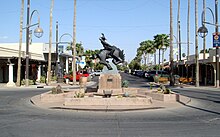

The city has an annual Scottsdale Arts Festival.
The highest concentrations of galleries, studios and museums that are open to the public are in Downtown Scottsdale. Its Scottsdale Arts District can be segmented into three distinct districts. The largest is the Scottsdale Main Street Arts District, home to the largest and most diverse collection of styles and genres, the more contemporary Marshall Way Arts District, and the more touristy and western-themed Old Town district, which has the Scottsdale Museum of Contemporary Art. The popular Scottsdale Artwalk is held weekly, every Thursday evening.
Scottsdale's affluent culture has been depicted by shows such as MTV's My Super Sweet 16, which filmed an episode in the area in 2006, and by the short-lived CBS reality show Tuesday Night Book Club.
Annual cultural events and fairs
"The West's most western town" prides itself in its rich Western history, preserving while heavily promoting its plethora of "western" activities and events. The Scottsdale Arabian Horse Show has taken place since 1955. Today, the show attracts thousands of visitors and tourists, to see nearly 2000 purebred Arabian and Half-Arabian horses competing for various prizes and recognition. The show also features over 300 vendors and exhibitions, and over 25 demonstrations and shows.
The Scottsdale Jaycees Parada del Sol, an annual month-long event that has been held in Scottsdale since 1954. Originally named The Sunshine Festival, the PRCA Rodeo was added in 1956. Cowboys and cowgirls from across the nation converge in Scottsdale to participate in this cultural and historical event. The event begins each year with the Parada del Sol Parade, the world's largest horse-drawn parade with over 150 entries in any given year.
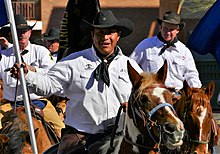
Since 1971, Scottsdale has been home to the Barrett-Jackson Auto Show. Due to the success of this week-long event held every January, the organizers behind it have more recently inaugurated similar but smaller shows in Palm Beach, Florida and Las Vegas, Nevada. Now held at the expansive West World exhibition complex in North Scottsdale, the event is an auto enthusiast's and collector's spectacle. The show is known for featuring both exotic, luxury automobiles and historic vehicles which have been expertly restored to mint condition.
Since 2007, Scottsdale has been hosting low and high fashion shows in the annual Scottsdale Fashion Week, including popular department store line fashion designers and some higher end ones during the month of November.
The Scottsdale Culinary Festival is held annually during April. Though many of its individual events are held citywide, they concentrate in the downtown area. Entirely, it is estimated the week-long festival draws over 40,000 people. The most heavily attended such event is the festival's Great Arizona Picnic, an outdoor fair-like showcase of both well-known local and national chefs and restaurants. It is held on the lawn of the Scottsdale Civic Center Mall.
The annual Scottsdale International Film Festival concentrates on the use of film to foster of the world's cultures, lifestyles, religions, and ethnicities.
Museums and art galleries
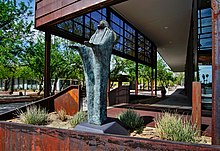
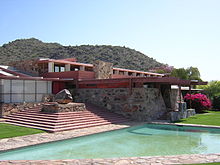
Scottsdale is home to more than 125 professional art galleries and studios, one of the highest per-capita anywhere in the nation. The city has quickly become a center for art in the United States. According to the Scottsdale Convention & Visitor's Bureau and American Style Magazine, the city has become one of the country's largest art markets, usually only sharing ranks with New York City, New York and Santa Fe, New Mexico in terms of commerce generated as a direct result of art sales and purchasing.
Its galleries and studios are noted for their western and Native American themed art, with a growing interest in contemporary arts over the past couple of decades – an element most visible by the large number of modern art galleries which have opened along the Marshall Way Arts District, and the opening of the Scottsdale Museum of Contemporary Art (also referred to as SMoCA) in 1999. Both are in Downtown Scottsdale. Located in the Old Town district of Downtown Scottsdale, the Scottsdale Civic Center Mall is home to the two-theater Scottsdale Center for the Performing Arts, the Scottsdale Historical Museum, as well as the Scottsdale Museum of Contemporary Art. SMoCA is the only permanent museum dedicated solely to the contemporary arts in the state of Arizona. Also in Old Town, Western Spirit: Scottsdale's Museum of the West opened in January 2015, featuring historical and cultural exhibits from 19 states of the American West, including Arizona.
Taliesin West, architect Frank Lloyd Wright's winter home and school from 1937 until 1959, is now one of the most popular tourist attractions in Arizona. The complex is in the northeast fringe of the city, at the base of the McDowell Mountains.
Nightlife

Scottsdale is home to a variety of nightclubs, restaurants, hotels, lounges and bars most notably in the Old-Town district. This is evident by the growing number of style-conscious hotels that have opened up throughout Downtown Scottsdale which equally cater to the nightlife crowds.
The majority of nightlife is concentrated in Downtown Scottsdale, between Camelback and Osborn roads. This is the most active and popular nightlife destination in the Phoenix Metropolitan Area. Similar to well-known nightclub districts in other major cities, much like Atlanta's Buckhead district and Miami's South Beach, most of Downtown Scottsdale's major bars and clubs are generally within walking distance. Crowds of over 40,000-strong are known to congregate to this area. Old Town Scottsdale consists of active night clubs, dive bars, entertainment restaurants and shopping around every corner. Scottsdale Fashion Square introduces the Old Town Scottsdale lifestyle with approximately 2 million square feet of luxury retail space.
Attractions
There are several attractions within the city of Scottsdale. There is the newly built Great Wolf Lodge water park and hotel right off of the 101 freeway. The Talking Stick Resort is an attraction and a part of the Scottsdale night life with their 98,000 square feet casino. Within the same vicinity are the Butterfly Wonderland, OdySea Aquarium that holds over 6,000 animals in 2,000,000 gallons of water, iFly Zone and many shopping centers including Fashion Square, just north of Old Town Scottsdale. Scottsdale Fashion Square introduces Old Town Scottsdale being in the top 30 largest malls in the country and providing upscale shopping and luxury.
Indian gaming
Southeast Scottsdale borders the Salt River Pima-Maricopa Indian Community. For several years, the Scottsdale Pavilions, a major outdoor shopping center, marked the only commercial property operating on tribal lands. In 1998, the tribe opened the first permanent casino in the Scottsdale area, Casino Arizona, at Loop 101 and McKellips Road. The success of Casino Arizona led to the construction of a second location, Casino Arizona at Indian Bend, in a temporary facility less than 8 miles (13 km) north.
The passage of Proposition 202 in November 2002 redefined casino gaming in Arizona, permitting "Vegas-style" blackjack and poker, expanded number of slot machines and wider food and beverage service options. Both casinos underwent significant expansions following the passage of Proposition 202, with Casino Arizona at Indian Bend more than doubling in size.
In 2010, the temporary tent facilities hosting the 120,000-square-foot (11,000 m) Casino Arizona at Indian Bend were deconstructed following the opening of Casino Arizona at Talking Stick Resort. The 240,000-square-foot (22,000 m) casino is adjoined to the newly constructed 15-story Talking Stick Resort & Spa, which features the Talking Stick golf course, a 36-hole golf course designed by Ben Crenshaw and Bill Coore. Today, the two casinos collectively have over 2,000 slot machines and 100 table games.
Historic properties in Scottsdale
Main article: List of historic properties in Scottsdale, ArizonaThere are numerous properties in the city of Scottsdale which are considered to be historical and have been included either in the National Register of Historic Places or the Scottsdale Historic Register. The gallery contains images of properties listed in the National Register of Historic Places with a short description of each.
Gallery of historic properties on National Register of Historic Places
-
 Scottsdale Grammar School, also called The Little Red Schoolhouse, built in 1909
Scottsdale Grammar School, also called The Little Red Schoolhouse, built in 1909
-
 George Ellis House, built in 1925
George Ellis House, built in 1925
-
 Louise Lincoln Kerr House, built in 1925
Louise Lincoln Kerr House, built in 1925
-
 Frank Tilus House, built in 1875
Frank Tilus House, built in 1875
-
The Valley Field Riding and Polo Club of Scottsdale, built in 1924
-
 Roald Amundsen Pullman private railroad car
Roald Amundsen Pullman private railroad car
Sports and recreation
The city is the spring training home of the San Francisco Giants, who practice at Scottsdale Stadium in Downtown Scottsdale. Scottsdale Stadium also hosts the Scottsdale Scorpions, a minor league baseball team in the Arizona Fall League. In February 2011 the Colorado Rockies and Arizona Diamondbacks began sharing a new spring training facility, Salt River Fields at Talking Stick, located on the city's eastern border with the Salt River Pima-Maricopa Indian Community.
Though none play specifically in the city of Scottsdale, three of the "Big Four" North American major league sports organizations have franchises and play within the Phoenix Metropolitan Area – NBA's Phoenix Suns, NFL's Arizona Cardinals, MLB's Arizona Diamondbacks and formerly the NHL's Arizona Coyotes, as well as a WNBA franchise, the Phoenix Mercury.
Phoenix Rising FC, a member of the United Soccer League, played their home matches at Phoenix Rising FC Soccer Complex, a temporary stadium near Loop 101 and Loop 202.

Since 2010, the historic WM Waste Management Phoenix Open Golf Tournament – formerly the FBR Open and Phoenix Open, which originally began in 1932 – is now held annually each January at the Tournament Players Club (or "TPC") in North Scottsdale. The TPC is adjacent to the large Fairmont Scottsdale Resort. It is the largest-attended stop of the annual PGA Tour, attracting well over 500,000 people to the four-day event alone.
Hiking, rock climbing and other similar outdoor activities are enormously popular throughout the Phoenix area, in large part to the immediate accessibility of mountain areas within or very near the city limits. Citizens flock ritually to local favorite Camelback Mountain, in the eastern section of Phoenix, just adjacent to Scottsdale, as well as the McDowell Mountains in the McDowell Sonoran Preserve, at the city's northeastern fringes.

On January 19, 2013, the Talking Stick Resort hosted King of the Cage's televised mixed martial arts event, Regulators. The show, now owned by the Ultimate Fighting Championship, featured future UFC talent like Cody East, Jordan Johnson and flyweight championship contender Ray Borg.
Golf
Scottsdale is a noted golf and resort destination, with a sizable portion of tax revenue being derived from tourism. It is also home to the Phoenix Open Golf Tournament held at the Tournament Players Club every year and the Barrett-Jackson car show held at WestWorld.
In all, the city is home to more than 200 area courses offering layouts that range from the rolling green fairways of traditional courses, to desert golf designs. In 2006, the Robb Report cited Scottsdale as "America's Best Place to Live for Golf." The Boulders Resort & Golden Spa and Four Seasons Resort Scottsdale at Troon North were selected in 2005 as the second and fourth best golf resorts in the nation by Travel + Leisure Golf magazine. Other golf courses in the area include FireRock, Troon North, The Phoenician, Desert Highlands, Silverleaf, and Desert Mountain.
Scottsdale National Golf Club is a private golf club in the McDowell Mountain Range, the course itself is a par 72 on 290 acres (1.2 km). In the past, it has received awards from Golf Digest and Golfweek. It hosts an 18-hole course as well as a nine-hole course called "The Bad Little Nine." The club also hosts the "Wild West Invitational," a tournament including a final round where competitors must contend with loud distractions. It has also been mentioned as a possible location for future PGA Championships.
Additional
- Scottsdale Gun Club (2004)
Government

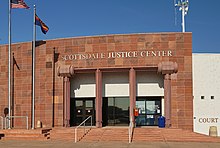
Scottsdale is governed by a mayor and city council, all of whom are elected "at large" to represent the entire city rather than districts within the city. A city manager is responsible for the executive leadership of the city staff, as well as implementing council policies, developing programs and budgets to respond to council goals, and ensuring citizens receive effective and efficient city services. The city manager also serves as the city treasurer.
As of 2021, the current mayor is David Ortega.
Scottsdale is part of Arizona's 1st congressional district.
The distinctive Scottsdale City Hall was designed by architect Bennie Gonzales in 1968, and was designed with an interior kiva for community meetings.
Politics
| Year | Democratic | Republican | Third Parties |
|---|---|---|---|
| 2020 | 47.62% 74,540 | 51.17% 79,877 | 1.21% 1688 |
| 2016 | 43.16% 53,996 | 50.78% 63,533 | 6.06% 7573 |
Education
See also: List of school districts in Phoenix, ArizonaPublic education in Scottsdale is provided for by multiple school districts. Scottsdale Unified School District (SUSD) serves most of Scottsdale, most of the town of Paradise Valley, as well as parts of Tempe and east Phoenix. The Paradise Valley Unified School District (PVUSD), serves northeast Phoenix and North Scottsdale. SUSD serves 25,668 students in 33 schools and employs 3,862, including 1,551 teachers. SUSD's 33 schools include five high schools: Arcadia High School, Coronado High School, Chaparral High School, Desert Mountain High School, and Saguaro High School. PVUSD is the 7th largest school district in the state, with approximately 30,000 students and 3,800 employees. It contains 47 schools, including 7 high schools. The high schools which serve portions of Scottsdale are Horizon High School and Pinnacle High School. Other portions of Scottsdale are in the Cave Creek Unified School District, the Fountain Hills Unified School District, and the Balsz Elementary School District and Phoenix Union High School District.
The primary institution of higher education in the city is Scottsdale Community College, which opened in 1970 on the Salt River Pima Maricopa Indian Reservation. In 1999, the school opened a second campus in the Scottsdale Airpark allowing it to serve the business community and north Scottsdale. Other institutions of higher education with locations in Scottsdale include the Mayo Clinic School of Medicine, University of Phoenix, Gateway Seminary, and the Scottsdale Culinary Institute. Many students at nearby Arizona State University in Tempe live in Scottsdale and commute.
Scottsdale has a main branch and four branches within the Scottsdale Public Library System.
Infrastructure
Transportation
Freeways
State Route 101 – locally known as Loop 101 – provides convenient Metropolitan Phoenix Freeways access.
Air
The city is home to Scottsdale Municipal Airport (IATA: SCF, ICAO: KSDL), a single-runway airport in North Scottsdale. While the airport serves some tour and commuter flights, the plurality of aircraft operations are corporate and transient general aviation traffic.
Commercial air travel is served by Sky Harbor International Airport (IATA: PHX, ICAO: KPHX) in Phoenix and Phoenix Mesa Gateway Airport (IATA: AZA, ICAO: KIWA) in Mesa.
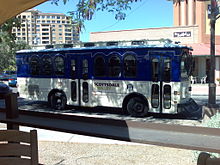
Public transit
Public bus service for Scottsdale and the Phoenix Metropolitan Area is provided by Valley Metro.
The city of Scottsdale runs a network of local neighborhood circulators, labeled the "Scottsdale Trolley." Using trolley-replica buses, the public service is free to riders. As of 2021, there are two circulating "routes," known individually as the Downtown Trolley and the Neighborhood Trolley. These connect at the Loloma Station transit center in downtown Scottsdale.
The Downtown Trolley circulates through downtown Scottsdale, and the Neighborhood Trolley circulates from downtown Scottsdale to neighborhoods throughout South Scottsdale, connecting with the city of Tempe's own free public circulator, the Tempe Orbit at Roosevelt and Scottsdale Road. From there, riders can transfer onto the Tempe Orbit, and travel to Tempe, including Arizona State University's main campus, and the downtown Tempe, or Mill Avenue, area.
Between December 2007 and 2009, Scottsdale was a member of the board of Valley Metro Rail line which connects the neighboring cities of Phoenix, Tempe and Mesa. There was a study in 2001, and some discussion since, of extending the light rail line into Scottsdale. The city's Transportation Master Plan identifies Scottsdale Road as the city's high-capacity corridor, which could be light rail, modern streetcar service, or bus rapid-transit (BRT).
A street railway interurban line was proposed to connect Scottsdale with Phoenix, Tempe, and Mesa as early as 1913 but was never built; Scottsdale is the largest American city that has never had a rail line.
Notable people
Main article: List of people from Scottsdale, ArizonaSister cities
Scottsdale has eight sister cities, as designated by Sister Cities International:
 Álamos, Sonora, Mexico
Álamos, Sonora, Mexico Cairns, Queensland, Australia
Cairns, Queensland, Australia Interlaken, Switzerland
Interlaken, Switzerland Haikou, Hainan, China
Haikou, Hainan, China Kingston, Ontario, Canada
Kingston, Ontario, Canada Marrakech, Morocco
Marrakech, Morocco Uasin Gishu, Kenya
Uasin Gishu, Kenya Killarney, Ireland
Killarney, Ireland
See also
- Arizona Canal
- Central Arizona Project
- List of people from Phoenix
- List of films shot in Scottsdale
- List of historic properties in Scottsdale, Arizona
References
- "City of Scottsdale – Mayor David Ortega".
- ^ "2021 U.S. Gazetteer Files: Arizona". United States Census Bureau. Retrieved May 10, 2022.
- ^ "Scottsdale". Geographic Names Information System. United States Geological Survey, United States Department of the Interior.
- ^ "Scottsdale city, Arizona: 2020 DEC Redistricting Data (PL 94-171)". U.S. Census Bureau. Retrieved May 10, 2022.
- "Scottsdale, Arizona Population History | 1990–2021". www.biggestuscities.com. Retrieved October 10, 2022.
- "City of Scottsdale – About Scottsdale". City of Scottsdale. Retrieved October 30, 2022.
- Hadden, Joey. "Step inside Scottsdale, Arizona, where migrating millionaires have created one of the hottest housing markets in the country". Business Insider. Retrieved May 8, 2024.
- "City of Scottsdale – About Scottsdale". City of Scottsdale. October 31, 2022.
- Saxton, Dean, Saxton, Lucille, & Enos, Susie. (1983). Dictionary: Tohono O'odham/Pima to English, English to Tohono O'odham/Pima. Tucson, Arizona: The University of Arizona Press
- "The Best of Scottsdale". Archived from the original on January 6, 2014. Retrieved January 5, 2014.
- ^ "The West's Most Western Town". Scottsdaleaz.gov.
- 1634–1699: McCusker, J. J. (1997). How Much Is That in Real Money? A Historical Price Index for Use as a Deflator of Money Values in the Economy of the United States: Addenda et Corrigenda (PDF). American Antiquarian Society. 1700–1799: McCusker, J. J. (1992). How Much Is That in Real Money? A Historical Price Index for Use as a Deflator of Money Values in the Economy of the United States (PDF). American Antiquarian Society. 1800–present: Federal Reserve Bank of Minneapolis. "Consumer Price Index (estimate) 1800–". Retrieved February 29, 2024.
- Messinger, Paul. "Scottsdale got its name through newspaper error". The Arizona Republic. Retrieved February 7, 2023.
- ^ "History of Scottsdale". Scottsdale Convention & Visitor's Bureau.
- "About Scottsdale". InSider Scottsdale.
- "Scottsdale's History in Pictures". Scottsdale Public Library. Archived from the original on January 6, 2014. Retrieved January 5, 2014.
- Phoenix City Directory. Arizona Directory Company. 1912. p. 3.
- "Scottsdale's History in Images". Scottsdale Public Library. - "Scottsdale's History in Images". Scottsdale Public Library.
- "Scottsdale Historic Register" (PDF). Scottsdale. Archived from the original (PDF) on July 2, 2014. Retrieved January 5, 2014.
- "Electric Railway Journal articles archived by the Phoenix Trolley Museum". Retrieved July 11, 2011.
- "History of Cotton in Arizona: A Timeline" (PDF). Jandatri.com. Archived from the original (PDF) on January 27, 2015. Retrieved January 27, 2015.
- "Jokake Inn History". The Phoenician Inn.
- "Taliesin Historical Legacy". Taliesin.
- "The Frank Lloyd Wright Spire". Live Better in Scottsdale. February 14, 2012.
- "Scottsdale Airport History". Scottsdaleaz.gov.
- "Papago Park POW Camp". Retrieved March 21, 2023.
- Myers, Patricia Seitters. "Scottsdale: Jewel in the Desert".
{{cite journal}}: Cite journal requires|journal=(help) - Nowicki, Dan (July 26, 2004). "Swinging Safari, Valley Ho were happening in the 1950s". Arizona Republic.
- ^ "Indian Bend Wash Book" (PDF). Scottsdale. Archived from the original (PDF) on July 2, 2014. Retrieved January 5, 2014.
- "From Ditch to Diamonds". Scottsdale Trails. November 14, 2011.
- ^ "Key Events in the History of Scottsdale". Scottsdale Museum.
- ^ "The Story Behind Scottsdale's McCormick Ranch". Arizona Oddities. December 22, 2009.
- "History of McCormick Ranch". McCormick-Stillman Railroad Park.
- "Scottsdale Ranch History". Archived from the original on January 6, 2014. Retrieved January 5, 2014.
- "McDowell Mountain Ranch History".
- "Desert Mountain History".
- ^ "History". DC Ranch.
- "What Trail Led Us Here". McDowell Sonoran Conservancy. Archived from the original on January 6, 2014. Retrieved January 5, 2014.
- "Scottsdale History Archived April 27, 2006, at the Wayback Machine." Scottsdale Convention & Visitors Bureau Archived August 30, 2012, at the Wayback Machine. Retrieved on June 1, 2006.
- "The U.S. Conference of Mayors : City Livability Awards". Archived from the original on January 8, 2017. Retrieved January 6, 2017.
- Arizona, Scottsdale. "Scottsdale History". scottsdaleaz. Archived from the original on June 2, 2020. Retrieved May 10, 2020.
- "Scottsdale Airport History". Scottsdale. Archived from the original on October 20, 2020. Retrieved May 10, 2020.
- www.scottsdaleaz.gov https://www.scottsdaleaz.gov/System/404.htm?aspxerrorpath=/assets/public+website/about/fy_2013-14_scottsdale_overview.pdf.
{{cite web}}: Missing or empty|title=(help) - "Butte Peak AZ". www.surgent.net.
- ^ "Indian Bend Wash: Construction Complete." United States Environmental Protection Agency. Page last updated on February 16, 2007. Retrieved on February 28, 2007.
- "Scottsdale Arizona CVB : Hotels, Golf and Vacation Planning for Scottsdale AZ". Archived from the original on April 27, 2006. Retrieved June 2, 2006.
- "Classic Refuse Trucks – City of Scottsdale". www.classicrefusetrucks.com. Retrieved May 30, 2020.
- Koeppel, Geri. "Older area of Scottsdale has built-in value." Arizona Republic. November 30, 2008. Retrieved on December 3, 2008
- City of Scottsdale Shea Area Plan."City of Scottsdale – Shea Area Plan Archived December 3, 2019, at the Wayback Machine.Retrieved on December 2, 2019
- Butler, Jay; Lambrakis, Christine. "Greater Phoenix August Resale Market Housing Price Increases Slow." Arizona State University. September 14, 2005. Retrieved on August 9, 2006.
- "Auto dealerships get new purpose". archive.azcentral.com.
- "Airpark loses GM dealership". archive.azcentral.com.
- "SkySong Center – The ASU Scottsdale Innovation Center". www.skysong.com.
- "SkySong: Project Overview Archived April 18, 2007, at the Wayback Machine." skysongcenter.com. February 2007. Retrieved on April 29, 2007.
- "Largest Shopping Malls in the United States (2004) Archived February 21, 2009, at the Wayback Machine." American Studies, Eastern Connecticut State University. December 17, 2005. Retrieved on August 9, 2006.
- Christie, Les. "Real estate cools down." CNN Money. May 16, 2006. Retrieved on July 6, 2006.
- "Ritz-Carlton to build $400 million Scottsdale resort-residential complex". USA Today. June 22, 2006. Retrieved September 1, 2008.
- Balazs, Diana (July 15, 2008). "Ritz-Carlton developer won't appeal ruling". The Arizona Republic. Retrieved September 1, 2008. - "Scottsdale Area Chamber of Commerce". Archived from the original on March 19, 2008. Retrieved March 8, 2008.
- "50,000 work in airpark area". Archived from the original on February 25, 2007. Retrieved March 8, 2008.
- "Scottsdale Weather: Records & Averages Archived March 3, 2007, at the Wayback Machine." Yahoo! Retrieved on April 30, 2007.
- "U.S. Climate Normals Quick Access – Station: Scottsdale MUNI AP, AZ". National Oceanic and Atmospheric Administration. Retrieved April 19, 2023.
- "NOAA Online Weather Data – NWS Phoenix". National Weather Service. Retrieved April 19, 2023.
- "Census of Population and Housing". Census.gov. Retrieved June 4, 2016.
- "Census 2020". Retrieved November 5, 2022.
- "P004 Hispanic or Latino, and Not Hispanic or Latino by Race – 2000: DEC Summary File 1 – Scottsdale city, Arizona". United States Census Bureau.
- "P2 Hispanic or Latino, and Not Hispanic or Latino by Race – 2010: DEC Redistricting Data (PL 94-171) – Scottsdale city, Arizona". United States Census Bureau.
- "P2 Hispanic or Latino, and Not Hispanic or Latino by Race – 2020: DEC Redistricting Data (PL 94-171) – Scottsdale city, Arizona". United States Census Bureau.
- "Demographics| Scottsdale AZ Demographics" (PDF). Scottsdale. Archived from the original on December 30, 2021. Retrieved October 31, 2019.
- "First Church| First Scottsdale Church". www.fbcscottsdale.church/. Retrieved June 12, 2020.
- History of CBI Archived June 22, 2008, at the Wayback Machine, Synagogue website, Our Community. Accessed December 4, 2008.
- Ettenborough, Kelly. Arizona's Sanctuaries, Retreats, and Sacred Places, Big Earth Publishing, 2003, ISBN 9781565794382, p. 25.
- Crandall, Sean. "Armenian church to open first Arizona sanctuary". AZ Central. Retrieved July 17, 2019.
- "Headline News." Downtown Scottsdale Bulletin. November 7, 2006. Retrieved on April 18, 2007.
- "AAA/CAA Five Diamond Hotels – January 16, 2015" (PDF). AAA. January 16, 2015. Archived from the original (PDF) on January 19, 2016. Retrieved February 27, 2015.
- "50. Scottsdale, Ariz". Money.
- Roxborough, Shannon. "Tourists often wind up buying second homes." northjersey.com. April 15, 2007. Retrieved April 18, 2007.
- "Mayo Clinic Scottsdale (website)." Retrieved April 29, 2007.
- Best places to practice Retrieved February 23, 2017.
- "Five Arizona companies land in 'Fortune' 500". Phoenix Business Journal. Retrieved September 30, 2019.
- "Annual Comprehensive Financial Report" (PDF). City of Scottsdale. October 26, 2022. Archived from the original (PDF) on May 8, 2023. Retrieved May 12, 2023.
- Totten, Steven (August 7, 2016). "Scottsdale Fashion Square maintains its shopping stronghold with new retailers". Phoenix Business Journal. Archived from the original on August 12, 2016. Retrieved December 18, 2016.
- "Two More Apple Stores To Open In Arizona And Washington D.C." The Apple Pips. December 14, 2016. Archived from the original on December 20, 2016. Retrieved December 18, 2016.
- "Scottsdale Fashion Square". About Travel. August 31, 2016. Archived from the original on February 17, 2007. Retrieved December 18, 2016.
- Vanek, Corina (October 16, 2023). "More than 1,000 apartment, condo units underway at 120-acre One Scottsdale development". AZ Central. Retrieved December 21, 2023.
- "Yahoo Finance - Business Finance, Stock Market, Quotes, News". finance.yahoo.com.
- Sharon Edelson (September 23, 2008). "Palmeraie Heats Up Luxe Retail Competition in Arizona". Penske Media Corporation. Retrieved October 9, 2017.
- "Save the date ... for a really long time". October 26, 2008. - "AmericanStyle Magazine". Archived from the original on July 21, 2011. Retrieved March 4, 2022.
- Scharnberg, Kirsten. "A new sin city: 'Snottsdale'", Chicago Tribune, July 4, 2006. Retrieved July 6, 2006.
Rose, Jaimee. "Welcome to Marissa's world Archived November 20, 2006, at the National and University Library of Iceland", Arizona Republic, April 26, 2006. Retrieved July 6, 2006. - cpcomapreable, Judy. "Scottsdale Arabian Horse Show Archived May 8, 2006, at the Wayback Machine." About.com. Retrieved on August 9, 2006.
- "Scottsdale Jaycees Parada del Sol – History Archived August 18, 2006, at the Wayback Machine." Scottsdale Jaycees. Retrieved on August 16, 2006.
- "Scottsdale Fashion Week | Scottsdale, Arizona". Retrieved March 21, 2023.
- "Homepage". Scottsdale Culinary Festival.
- "Listings of Scottsdale Art Galleries Archived July 11, 2006, at the Wayback Machine." Scottsdale Convention & Visitors Bureau. Retrieved on July 6, 2006.
- Staff Writer. "Things to do in Phoenix." The Arizona Republic. June 7, 2006. Retrieved on December 7, 2006.
- "Scottsdale's Museum of the West". Scottsdale's Museum of the West. February 17, 2015. Retrieved February 17, 2015.
- Clark, Jayne (December 20, 2007). "Old West meets New West in Scottsdale, Ariz". USA Today. Retrieved May 23, 2010.
- "Casino Arizona Vol. 15, No. 25 Card Player Magazine". www.cardplayer.com.
- "Scottsdale, Arizona Casinos". www.worldcasinodirectory.com.
- "National Register of Historical Places – Arizona (AZ), Maricopa County". nationalregisterofhistoricplaces.com.
- www.scottsdaleaz.gov https://web.archive.org/web/20201001220823/https://www.scottsdaleaz.gov/System/404.htm?aspxerrorpath=%2F404.htm. Archived from the original on October 1, 2020. Retrieved September 21, 2020.
{{cite web}}: Missing or empty|title=(help) - "Scottsdale Stadium." City of Scottsdale (website). Retrieved on April 18, 2007.
- AZ, Scottsdale. "Scottsdale Sports". scottsdaleaz. Retrieved June 19, 2019.
- "UFC® FIGHT PASS™ -KOTC: Regulators". www.ufc.tv.
- "Best Golf States". Golf Digest.
- Bennett, Liam. "Scottsdale's Fantasy 18 Archived January 13, 2009, at the Wayback Machine." Scottsdale Convention & Visitors Bureau Archived August 30, 2012, at the Wayback Machine. Retrieved on June 1, 2006.
- Staff Writer. "2005 World's Best Golf Resorts." Travel + Leisure Golf. Retrieved on July 6, 2006.
- "Scottsdale National Golf Club, Scottsdale, AZ". GolfLink. Retrieved December 19, 2017.
- Matuszewski, Erik. "The Baddest Nine Holes In Golf Has PXG Ties And A $1,000 Offer To Break Par". Forbes. Retrieved December 19, 2017.
- Matuszewski, Erik. "Has Billionaire Bob Parsons Created Golf's Wildest Member-Guest Tournament?". Forbes. Retrieved December 19, 2017.
- Hennessey, Stephen. "PGA Championship 2017: 11 venues that could now host a major in May - Golf Digest". Golf Digest. Retrieved December 19, 2017.
- "Mayor David Ortega". City of Scottsdale website. Retrieved January 29, 2021.
- Scarp, Mark (December 4, 2008). "Gonzales left his creative imprint on Scottsdale". East Valley Tribune. Retrieved January 4, 2009.
- "DRA 2020". Daves Redistricting. Retrieved March 21, 2023.
- ^ "Scottsdale Unified School District: About Us". Scottsdale Unified School District. Retrieved January 24, 2014.
- "Paradise Valley Unified School District Description". Paradise Valley Schools. Archived from the original on January 27, 2014. Retrieved January 24, 2014.
- "Paradise Valley Unified School District Schools". Paradise Valley Schools.
- "2020 CENSUS - SCHOOL DISTRICT REFERENCE MAP: Maricopa County, AZ" (PDF). United States Census Bureau. pp. 3, 7 (PDF pp. 4, 8/11). Archived (PDF) from the original on October 9, 2022. Retrieved September 12, 2024.
- Fudala, Joan (2001). Historic Scottsdale: A Life from the Land. Singapore: Historical Publishing Network. p. 77. ISBN 1-893619-12-5.
- Scottsdale Public Library Locations and Hours
- "The Appaloosa Library". Archived from the original on July 5, 2008. Retrieved March 21, 2009.
- "City of Scottsdale - Trolley". www.scottsdaleaz.gov. Archived from the original on September 30, 2019. Retrieved September 30, 2019.
- Powell, Brian (December 13, 2007). "City opts for seat at Valley light-rail planning table". East Valley Tribune. Archived from the original on July 27, 2009. Retrieved February 1, 2009.
- www.scottsdaleaz.gov https://www.scottsdaleaz.gov/System/404.htm?aspxerrorpath=/traffic/transmasterplan.asp.
{{cite web}}: Missing or empty|title=(help) - "Interurban Line Proposed". Phoenix Gazette. June 20, 1913.
- Schwieterman, Joseph P. (2004). When the Railroad Leaves Town: American Communities in the Age of Rail Line Abandonment, Western United States. Kirksville, Missouri: Truman State University Press. p. xxiv. ISBN 978-1-931112-13-0. OL 8801889M.
- "Interactive City Directory: Scottsdale, Arizona". Sister Cities International, Inc. Archived from the original on March 3, 2016. Retrieved March 28, 2013.
- ^ "Data Visualizations – Asia – Sister Partnerships – Asia – Asia Matters for America". Data Visualizations – Asia – Sister Partnerships – Asia – Asia Matters for America.
External links
- Official website
- Scottsdale Area Chamber of Commerce
- Scottsdale Convention and Visitors Bureau Archived August 30, 2012, at the Wayback Machine
 Media related to Scottsdale, Arizona at Wikimedia Commons
Media related to Scottsdale, Arizona at Wikimedia Commons Geographic data related to Scottsdale, Arizona at OpenStreetMap
Geographic data related to Scottsdale, Arizona at OpenStreetMap
| The 100 most populous cities of the United States | ||||||
|---|---|---|---|---|---|---|
| ||||||
| Cities ranked by United States Census Bureau population estimates for July 1, 2022. | ||||||
